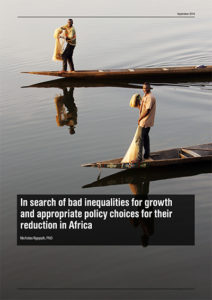This research paper, part of the series ‘Starting Strong: the first 1000 days of the SDGs’, identifies key actions toward addressing the unfinished business of the MDGs and how to reach those who are furthest behind in relation to the new SDGs.
 The paper attempts to inform Sustainable Development Goal implementation strategies focusing on Goals 1, 5, 8 and 10 in Africa. It starts by exploring the progress and limitations pertaining to the relevant SDGs in the African context. It follows by employing a systems Generalised Methods of Moments (GMM) regression technique to determine the impact of different inequalities on economic growth and then examines the underlying causes of those inequalities that impact economic growth negatively. Not all inequalities along the income distribution spectrum have the same impact on growth. There are bad inequalities with a negative impact on economic growth, and good inequalities with a positive impact on growth. The findings suggest that all inequalities between the middle and the bottom and between the bottom and top of the income distribution are bad for economic growth in Africa, and that the advantages that males have over females in labour market participation significantly reduce growth. Policy efforts that target the reduction of all the bad types of inequality by one point each would enhance growth by up to three percentage points in the next five years. To address skills inequality, policy considerations should emphasise increasing and extending educational spending beyond the primary level. Measures that address obstacles in the labour market against the poor, unskilled and women are to be encouraged. The proper management of urbanisation, governance of natural resource rents and addressing dependency through social inclusion measures are equally good for reducing bad types of inequality. As Africa searches for an industrialisation path, a strategy that prioritises the agricultural value chain would reduce bad inequalities and be more inclusive. In the short term, measures to promote the flow of external resources such as foreign aid and foreign direct investment into low skill labour-intensive sectors, and/or improve skills, can complement longer-term educational and skills development policies.
The paper attempts to inform Sustainable Development Goal implementation strategies focusing on Goals 1, 5, 8 and 10 in Africa. It starts by exploring the progress and limitations pertaining to the relevant SDGs in the African context. It follows by employing a systems Generalised Methods of Moments (GMM) regression technique to determine the impact of different inequalities on economic growth and then examines the underlying causes of those inequalities that impact economic growth negatively. Not all inequalities along the income distribution spectrum have the same impact on growth. There are bad inequalities with a negative impact on economic growth, and good inequalities with a positive impact on growth. The findings suggest that all inequalities between the middle and the bottom and between the bottom and top of the income distribution are bad for economic growth in Africa, and that the advantages that males have over females in labour market participation significantly reduce growth. Policy efforts that target the reduction of all the bad types of inequality by one point each would enhance growth by up to three percentage points in the next five years. To address skills inequality, policy considerations should emphasise increasing and extending educational spending beyond the primary level. Measures that address obstacles in the labour market against the poor, unskilled and women are to be encouraged. The proper management of urbanisation, governance of natural resource rents and addressing dependency through social inclusion measures are equally good for reducing bad types of inequality. As Africa searches for an industrialisation path, a strategy that prioritises the agricultural value chain would reduce bad inequalities and be more inclusive. In the short term, measures to promote the flow of external resources such as foreign aid and foreign direct investment into low skill labour-intensive sectors, and/or improve skills, can complement longer-term educational and skills development policies.
The ‘Starting Strong’ series is a collaborative partnership to initiate a wider conversation around priority actions for the first three years of the SDGs – just over 1000 days – with relevant stakeholders with a regional focus.
The author, Professor Nicholas Ngepah (PhD), is affiliated with the University of Johannesburg.
All opinions and assertions are those of the author. The usual disclaimers apply.

